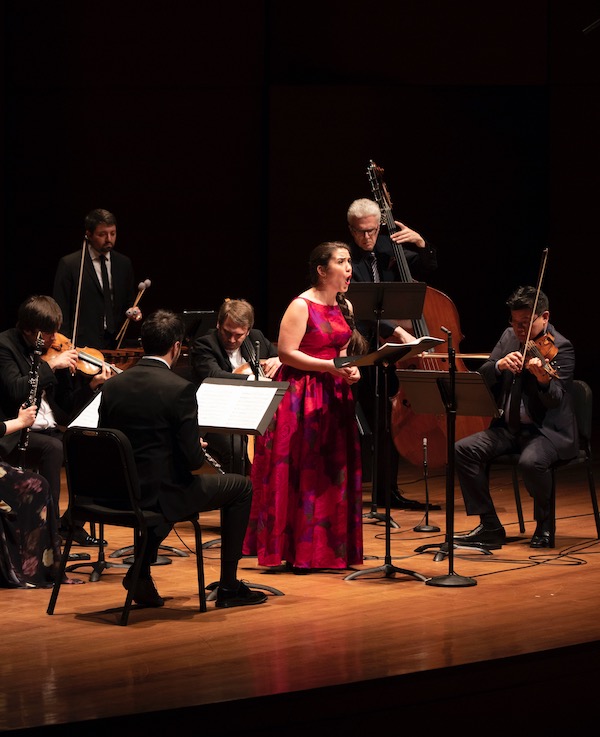Chamber Music Society explores a Schumann classic and choice rarities in rewarding program

The marquee item for the Chamber Music Society of Lincoln Center’s Sunday concert at Alice Tully Hall was Schumann’s Piano Quintet. A pillar of the chamber repertoire, Schumann’s quintet was an innovative piece within its genre and an expressive work in its own right. The rendition of it given on Sunday was a worthy anchor to a rewarding program.
This performance highlighted the inventiveness of Schumann’s writing, treating the small sub-groups within the already compact instrumentation as little chamber ensembles of their own: the Allegro brillante featured a lovely duet for cello and viola, passing the melody seamlessly back and forth between the two. This first movement captured the full spectrum of Romanticism, offering warm embraces and stormy angst in equal measure.
The second movement was all contrasts: between the solemn, buttoned-up funeral march and its lyrical foil, and with the altogether different mode of the anguished middle section, as the players dug in to find its raw core. They dove into the Scherzo with gusto, its angular edges making for a fierce, if still cheerful, romp. Their sensitive playing of the rhapsodic finale brought out the tension between its sunny warmth and the hints of darkness that lay just below the surface.
In all, this was a convincing performance of a deep and difficult work. But it was the first half of the program that showed the unique character of CMS programming, with a wide-ranging selection for a variety of instrumentations.
The evening started off with Mozart, the winning Flute Quartet in D major, K. 285. The flute really is the star here, taking the melodic lead while the others fill out the texture. Adam Walker was brilliant in his delivery of the difficult part, finding cool clarity in the Allegro, as his nimble playing led an overall complexion that was pure in tone, yet still warm. In the Adagio he showed broad dynamic range and sweet sensitivity in the enchanting canzonetta melody that Mozart lays over the pizzicato strings.
One of the most memorable items on Sunday’s concert was also its shortest, a performance of Schubert’s “Gretchen am Spinnrade” by soprano Joelle Harvey with Gilbert Kalish. It’s hard to do justice to this lied, which broke wide open the expressive possibilities of the form and began Schubert’s career as a master of song, but Harvey impressed with her intensely emotional reading.
Kalish set a slightly ponderous tempo, which Harvey filled out beautifully, combining a dark-colored soprano with deep understanding of the text. The overwhelming passion of her interpretation was best exemplified in the gripping build to the climactic cry of “Und ach, sein Kuss!”—and in the pause after, which felt like an enormous void in the middle of the song, the emotions of the previous phrase still hanging in the air.
The first half closed with the New York premiere of a CMS co-commission by John Harbison, If. A setting of Friedrich Hölderin’s poem “Wenn aus der Ferne” in Harbison’s own English translation, this is a poem of deep pain and loss, realized in an icy tonality for soprano, piano, flute, clarinet, bass, string trio, and marimba.
After an opening burst of acerbic chords, the ensemble wanders through a series of melodic ideas, none of them fully taking root. The soprano even seems to struggle to get past the first few words, repeating them on a short phrase that dances around its own tonic center. Harvey leaned into the dark fire of her middle voice to capture the insistent grief of the poem, while the instrumental ensemble communicated sardonic wit with short, sharp gestures.
The item that best captured what makes CMS unique was Ernest Chausson’s Chanson perpétuelle, for soprano and piano quintet. Just about eight minutes long, Chausson’s final complete work is a breathing, lyrical piece, with glowing writing for ensemble and a sighing vocal line that set the brighter side of Harvey’s middle range against the soft velvet of her chest voice.
Even the most seasoned concertgoer is unlikely to have heard the Chanson perpétuelle, if only because getting a soprano and a piano quintet on the same stage is so rare. In that way, CMS offers a vital reminder that there is a vast trove of music, even by composers whose portfolios we think we know, that we never get to hear in our larger concert halls.


